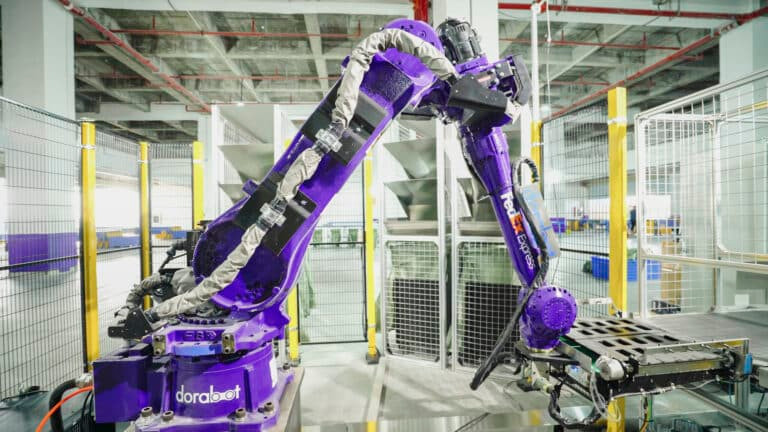FedEx Express today announced the launch of DoraSorter – an AI-powered intelligent sorting robot – in collaboration with Dorabot, a leading robotics solution provider for logistics.
The sorting robot represents the company’s latest push in digitising its operations and building a smart logistics network to handle the ever-growing volumes of e-commerce-related shipments in the region.
The first of its kind in China for FedEx, the DoraSorter robot is being deployed at the 5,200m2 FedEx South China E-Commerce Shipment Sorting Centre in Guangzhou.
DoraSorter is already part of the daily sorting operations and is capable of handling small inbound and outbound packages from e-commerce customers in South China.
While FedEx and Dorabot teams continue to fine-tune the robot based on operational requirements, and explore more application scenarios, DoraSorter’s core function of sorting parcels based on destination matches the sorting centre’s operation process.
Key features of DoraSorter include:
- At approximately 40m2, the robot can carry up to 10 kilograms of packages, covering up to 100 destinations simultaneously.
- The robot has a special drawer-shaped gripper that can connect with the conveyor belt seamlessly.
- Equipped with a barcode reader that scans package to obtain destination information, the robot uses its gripper to receive a package inward from the conveyor belt and moves it outward to the corresponding destination slot.
FedEx investment in this warehouse automation echoes broader industry trends. Triggered by the global pandemic, logistics players are optimising operational efficiencies, from warehouse management to last-mile delivery, to cater to the soaring demand for e-commerce products, seasonal peaks, and consumers’ heightened expectations for fast delivery.
According to McKinsey & Company, the global warehouse automation market is projected to reach $51 billion by 2030.2 By 2025, more than 4 million commercial robots will be installed at more than 50,000 warehouses.
“With e-commerce taking centre stage in the future of retail in our region, the speed with which a parcel can be picked up and delivered to customers’ doorsteps has become a dominant factor in driving the adoption of sorting robots. Bringing DoraSorter to China as a pilot program is a natural choice for us given it’s the world’s biggest e-commerce market with an expected valuation of $3.3 trillion by 2025,” said Kawal Preet, president of the Asia Pacific, Middle East and Africa (AMEA) region at FedEx Express. “As we look to build a data-driven, smart logistics network to help our customers thrive in the digital economy, this alliance with Dorabot is part of becoming the network for what’s next. AI-powered technology will continue to change how we support customers in the region and enhance supply chains for the future.”
“Innovation is at our core and is a major factor behind FedEx strategy in China,” said Robert Chu, vice president, Operations, FedEx China. “To meet customers’ changing needs, we have been exploring and investing in new technologies to enhance every key aspect of transportation. The rapid rise in e-commerce has led to higher customer demand for timeliness and flexibility in logistics services, creating new challenges and opportunities for the entire logistics industry. Our collaboration with Dorabot is our latest effort to improve operational efficiencies and build an agile logistics infrastructure through robotics technology that will support the growth of China’s e-commerce industry.”
“The use of DoraSorter helps FedEx sort a higher volume of cross-border e-commerce shipments,” said Xiaobai Deng, founder and CEO of Dorabot. “It is the starting point of a global collaboration between Dorabot and FedEx. We hope that we can work together to bring AI and robotics applications to more businesses and consumers.”




